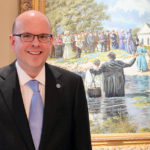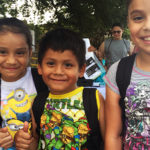KELLER—Pastors, rabbis and imams gathered at an “Unlikely” forum at a North Texas Baptist church to talk about how to live as good neighbors while holding to deeply held religious differences.
 Pastor Bob Roberts of Northwood Church in Keller, Imam Mohammad Magid and Rabbi David Saperstein—co-founders of the Multi-Faith Neighbors Network—organized the 2022 Global Faith Forum.
Pastor Bob Roberts of Northwood Church in Keller, Imam Mohammad Magid and Rabbi David Saperstein—co-founders of the Multi-Faith Neighbors Network—organized the 2022 Global Faith Forum.
“Unlikely Allies Building Flourishing Communities” was the theme of the event, which drew national and international figures—along with faith leaders—to Northwood Church.
In addition to hearing from diplomats, directors of nongovernmental organizations and clergy, a representative group of faith leaders signed a document pledging their commitment to “stop hate, make peace” and develop relationships that foster a sense of community across religious barriers.
“If your faith does not bring value to persons outside your faith, it’s probably not a healthy faith,” Roberts said.
Steps toward world peace should begin among adherents of the Abrahamic faiths—Judaism, Christianity and Islam, said Sam Brownback, former U.S. ambassador at large for international religious liberty.
“You’re going to have to get the children of Abraham to say, ‘We are not going to kill each other,’” said Brownback, a former Kansas governor and U.S. senator.
Shared values the seedbed for mutual respect
When Muslims, Jews and Christians recognize they share many of the same values, the “seeds of mutual respect” can grow and blossom, Mohammad Al-Issa, secretary general of the Muslim World League, told the Global Faith Forum.
Al-Issa was instrumental in creating the Charter of Makkah, a consensus document that urges Muslims to promote unity and peaceful coexistence. The charter calls on followers of Islam to embrace religious and cultural diversity and to denounce violence, terrorism and injustice.
Sign up for our weekly edition and get all our headlines in your inbox on Thursdays
More than 1,200 prominent Muslim leaders from 139 countries originally signed the document in 2019, and another 4,500 scholars representing 27 Islamic sects and schools of thought endorsed the charter.
Peace and understanding between people of different faiths demands a change of heart that takes time, Al-Issa told the forum.
“The pursuit of change can take more than a lifetime. It is no easy task. It doesn’t occur overnight,” he said. “It takes constant, consistent effort.”
Al-Issa condemned hate crimes perpetrated by extremists against those who hold different beliefs.
“These acts are committed by warped individuals who fear the unknown or have distorted the true interpretation of Scripture or falsely claim allegiance to a twisted idea of national or ethnic pride,” he said.
Recognize the image of God in all people
During a panel discussion at the forum, David Beasley, executive director of the United Nations World Food Programme, said delivering humanitarian aid to difficult places demands a willingness to work with people across the political, cultural and theological spectrum.
“We have to teach this one fundamental concept—that ‘love your neighbor’ transcends all faith differences,” Beasley said. “Everyone is made in the image of God.”
Walter Kim, an evangelical pastor in Charlottesville, Va., and president of the National Association of Evangelicals, emphasized the importance of respecting differences and exercising humility.
“As faithful followers of Jesus, we need to practice fundamental humility toward others and seek to learn their story,” Kim said. “This work is not optional. It is essential.”
‘Thick skin and long-term endurance’ required
Anyone committed to multi-faith engagement needs “thick skin and long-term endurance,” Roberts said, noting the likelihood of encountering opposition “from within your own tribe.”

He recalled first working with imams while engaged in missional work in Afghanistan and other places overseas. But when he began trying to promote understanding between evangelical Christians and Muslims locally, he said, his church lost hundreds of members.
Roberts told the forum he is a theologically conservative evangelical who believes in the exclusive claims of Jesus Christ. At the same time, he believes the command to show love for neighbors extends to all people.
In an interview, Roberts said the Multi-Faith Neighbors Network had planned a Global Faith Forum for two years, but it had to be cancelled three times due to COVID. All of the speakers agreed to speak for free about multi-faith engagement “because they believe in it so much,” he said.
The week before the Global Faith Forum, the Anti-Defamation League released a study reporting a 27 percent increase in the dissemination of antisemitic propaganda in 2021 and listing Texas among the states with the highest level of hate-group activity. The same report stated the Texas-based Patriot Front was responsible for 82 percent of all the white supremacist propaganda distribution last year.
Roberts said the location of the Global Faith Forum was intentional and important.
“If it can work here, it can work anywhere. You have to be in the heart of where the hell is,” Roberts said.
While “it takes more than sermons” to confront the hate speech inherent in QAnon and other white nationalist conspiracy theorists, prophetic religious leaders must confront falsehood, he insisted.
“Those people go to our churches,” Roberts said. “You can’t preach against QAnon every week. I get that. But you have to challenge the ideas. When you fail to do it, you are letting the weed grow that will ultimately destroy your own church.”














We seek to connect God’s story and God’s people around the world. To learn more about God’s story, click here.
Send comments and feedback to Eric Black, our editor. For comments to be published, please specify “letter to the editor.” Maximum length for publication is 300 words.